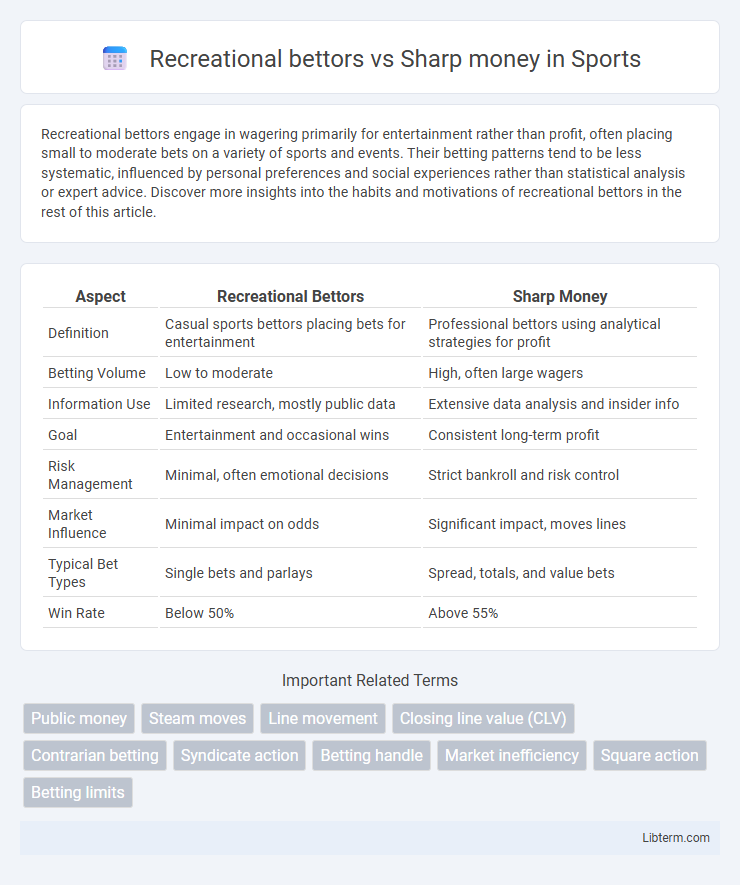Recreational bettors engage in wagering primarily for entertainment rather than profit, often placing small to moderate bets on a variety of sports and events. Their betting patterns tend to be less systematic, influenced by personal preferences and social experiences rather than statistical analysis or expert advice. Discover more insights into the habits and motivations of recreational bettors in the rest of this article.
Table of Comparison
| Aspect | Recreational Bettors | Sharp Money |
|---|---|---|
| Definition | Casual sports bettors placing bets for entertainment | Professional bettors using analytical strategies for profit |
| Betting Volume | Low to moderate | High, often large wagers |
| Information Use | Limited research, mostly public data | Extensive data analysis and insider info |
| Goal | Entertainment and occasional wins | Consistent long-term profit |
| Risk Management | Minimal, often emotional decisions | Strict bankroll and risk control |
| Market Influence | Minimal impact on odds | Significant impact, moves lines |
| Typical Bet Types | Single bets and parlays | Spread, totals, and value bets |
| Win Rate | Below 50% | Above 55% |
Understanding Recreational Bettors vs. Sharp Money
Recreational bettors typically place wagers based on favorite teams, popular narratives, or emotional preferences, frequently resulting in less informed bets and higher losses. Sharp money, conversely, represents bets from professional or well-informed bettors who utilize sophisticated data analysis, statistical models, and market insights to identify value and exploit inefficiencies. Understanding the distinction between recreational bettors and sharp money helps sportsbooks adjust lines and manage risk, as sharp money often moves markets more significantly than the volume of recreational bets.
Key Differences Between Recreational and Sharp Bettors
Recreational bettors primarily rely on intuition, favoring entertainment and casual wagers with limited research, whereas sharp bettors use data-driven strategies, analyzing odds and value to identify profitable opportunities. Sharp money is characterized by larger, more precise bets that exploit market inefficiencies, while recreational bettors typically place smaller, less calculated bets. Unlike recreational bettors, sharp bettors consistently generate long-term profits by leveraging advanced statistical models and betting analytics.
Motivations Behind Recreational Betting
Recreational bettors primarily engage in sports betting for entertainment and social interaction, often influenced by personal bias, team loyalty, or enjoyment rather than data-driven analysis. Their motivation centers around the thrill of the game and the potential for casual winnings, which contrasts sharply with sharp money bettors who rely on rigorous research and statistical models. Understanding the motivations behind recreational betting highlights why this segment often places larger bets on popular events with emotional attachment, creating market inefficiencies sharp bettors exploit.
Profile and Behaviors of Sharp Bettors
Sharp bettors are highly analytical and data-driven, utilizing advanced statistical models and deep market research to identify value bets and inefficiencies in betting lines. They consistently place sizable wagers on less popular markets where odds are mispriced, leveraging expert insights to maximize long-term profitability. Unlike recreational bettors who rely on intuition and entertainment, sharps prioritize discipline, bankroll management, and strategic timing to exploit bookmaker weaknesses.
Impact on Betting Markets: Sharps vs. Squares
Sharp money consists of professional bettors who utilize advanced analytics and extensive data to identify value bets, consistently influencing betting lines by forcing sportsbooks to adjust odds rapidly. Recreational bettors, or squares, often wager based on intuition, popular trends, or team loyalty, creating predictable betting patterns that sportsbooks exploit to maintain profit margins. The dynamic between sharps and squares significantly impacts betting markets, with sharp money driving line movements and enhancing market efficiency, while square bets contribute to market liquidity and imbalance.
How Oddsmakers React to Sharp Money
Oddsmakers adjust lines rapidly in response to sharp money, recognizing that professional bettors possess superior analytical skills and access to more accurate information. Sharp money movements signal valuable insights about true probabilities, prompting bookmakers to balance their books and minimize potential losses. This dynamic helps oddsmakers maintain market efficiency and protect their margins against informed wagers.
Common Strategies Used by Sharp Bettors
Sharp bettors employ advanced statistical models and extensive data analysis to identify value bets that recreational bettors often overlook due to emotional biases. They commonly use line shopping across multiple sportsbooks to maximize potential returns and hedge bets to manage risk effectively. Bankroll management is a core strategy, ensuring consistent profit growth while minimizing the impact of inevitable losses.
Mistakes Recreational Bettors Commonly Make
Recreational bettors often fall into the trap of emotional betting, relying on gut feelings instead of data-driven analysis, which leads to inconsistent results and losses. They frequently underestimate the impact of sharp money, ignoring market movements and line shifts that reflect informed betting by professional sharp bettors. Overvaluing public bias and failing to manage bankroll effectively are other common mistakes that hinder recreational bettors from achieving sustainable profitability.
Identifying Sharp Money Movements
Sharp money movements are characterized by large, consistently accurate bets placed by professional or experienced bettors who analyze odds and statistics deeply. Identifying these movements involves tracking sudden line shifts or increased betting volume on specific teams or outcomes, often against popular public opinion. These indicators signal informed wagers, contrasting with recreational bettors who typically follow trends or personal biases without strategic insight.
Tips for Transitioning from Recreational to Sharp Betting
Transitioning from recreational bettors to sharp money involves adopting data-driven strategies and disciplined bankroll management to improve long-term profitability. Sharps utilize advanced analytics, value betting, and line shopping to exploit market inefficiencies often overlooked by casual bettors. Focusing on continuous learning, tracking performance metrics, and avoiding emotional bets are essential steps in converting recreational habits into sharp betting expertise.
Recreational bettors Infographic

 libterm.com
libterm.com